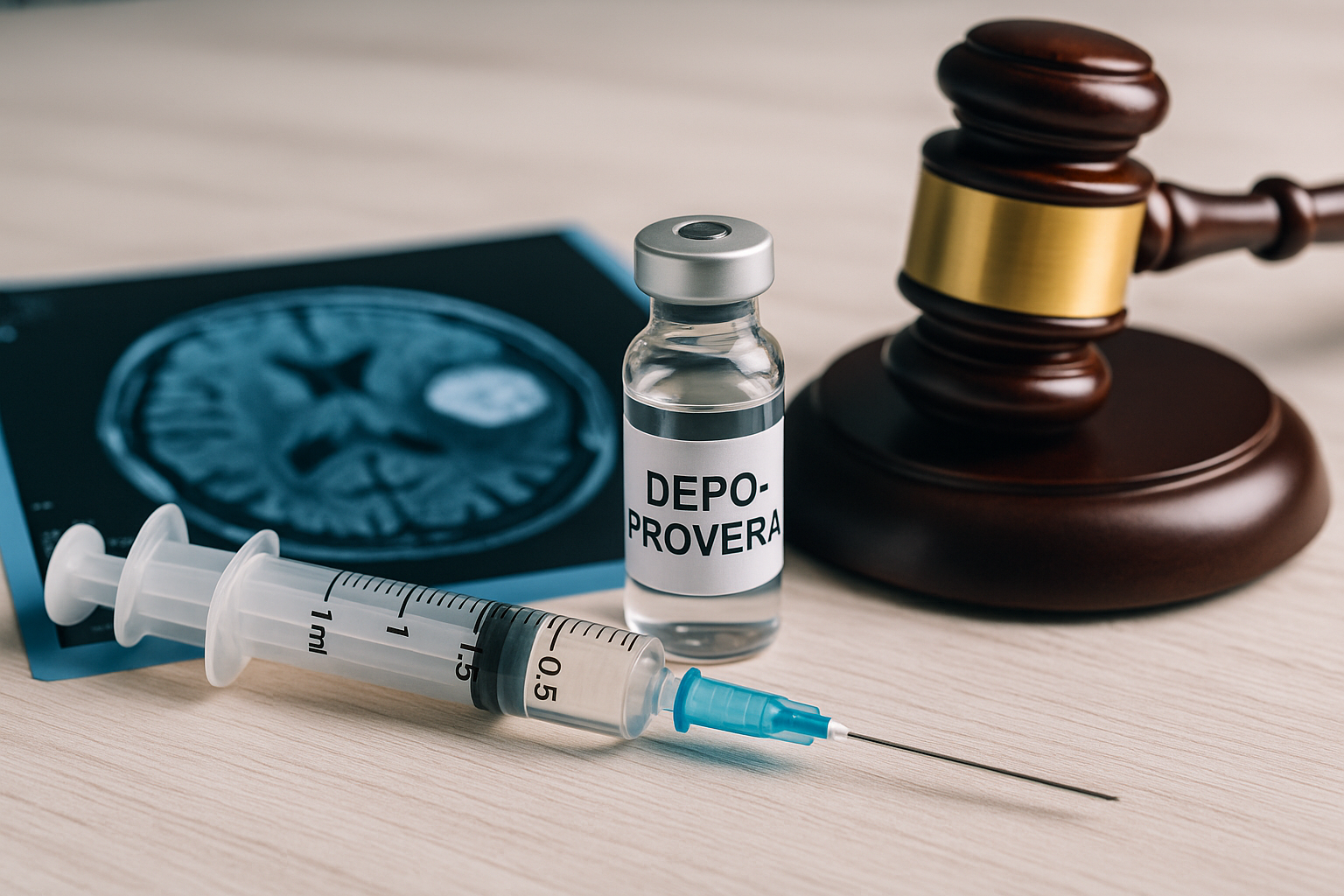New studies show a sharp rise in tumor risk after long-term use of Depo-Provera. Plaintiffs say Pfizer ignored the danger and failed to warn doctors or patients.
August 2025 — Washington, D.C.
The number of lawsuits over the birth control shot Depo-Provera has surged past 878 cases. Women across the United States say the drug, made by Pfizer Inc., caused meningioma brain tumors.
The federal court system combined these lawsuits into MDL No. 3140 in the Northern District of Florida. Judge M. Casey Rodgers is in charge of the proceedings. Other defendants include Pharmacia & Upjohn, Viatris Inc., Greenstone LLC, and Prasco Laboratories.
Scientific Studies Push Litigation Forward
A 2024 BMJ study linked medroxyprogesterone acetate (MPA) to a 5.6 times higher risk of meningioma. The study focused on women who used Depo-Provera for more than a year.
A 2025 study from the University of British Columbia confirmed this risk. It found a 3.55 times higher chance of developing meningioma. Researchers explained that meningiomas grow faster when exposed to progesterone hormones.
European regulators added meningioma warnings to Depo-Provera labels years ago. The FDA has not done so in the United States. The current boxed warning only mentions bone density loss.
Pfizer’s Defense Strategy
Pfizer argues that federal preemption blocks the lawsuits. The company says the FDA’s 2024 rejection of a label change prevents state courts from forcing a new warning.
Plaintiffs respond that Pfizer had the power to strengthen the warning through the CBE process. They say the FDA rejected only vague language, not a specific tumor warning.
A key hearing on this issue is set for September 29, 2025. The judge’s ruling will decide if hundreds of cases move forward or collapse.
State Courts Add More Pressure
The MDL is the main venue, but plaintiffs have also filed in state courts.
-
New York has more than 60 active cases.
-
California has 11 cases, with coordination still pending.
-
Delaware and Pennsylvania courts are seeing steady growth in filings.
Law experts warn that a state court trial could reach a jury before the federal MDL does. That outcome could raise early settlement pressure on Pfizer.
Settlement Outlook
No settlement has been reached yet. Lawyers predict tiered payouts based on severity.
-
Severe cases such as Grade III malignant meningiomas may reach $1 million or more.
-
Moderate cases may range from $300,000 to $650,000.
-
Lower-severity cases may range from $150,000 to $300,000.
-
Payouts in lower cases may fall between $150,000 and $300,000.
Other birth control lawsuits show that large payouts are possible. Essure settlements totaled $1.6 billion. Yaz and Yasmin settlements exceeded $2 billion. Pfizer has a market value of over $150 billion, which gives it the ability to handle billion-dollar settlements.
Human Impact
Women in the lawsuits describe injuries that changed their lives. Their stories show the toll of Depo-Provera tumors. Tina Thomas said her tumor damaged nerves in her ear. She lost her hearing and now lives with permanent impairment.
She said daily life became harder and independence slipped away. Edie R. described constant seizures after her diagnosis. Doctors performed a craniotomy to remove the tumor, but her health declined. She said she could not work again and the money loss was heavy.
Lawyers argue these accounts show Pfizer ignored clear safety signals.Lawyers argue clear warnings could have stopped these injuries. Women insist they would have chosen safer options if Pfizer told the truth.
What Happens Next
Judge M. Casey Rodgers will decide this fall if Pfizer can use preemption to block the lawsuits. A ruling in Pfizer’s favor could end many claims before trial. A ruling against Pfizer would allow the litigation to move into full discovery.
Discovery on medical evidence is set to continue through early 2026. Lawyers will collect expert testimony, medical records, and company documents. This stage will test the strength of the science linking Depo-Provera to meningioma.
If preemption fails, the court will prepare bellwether trials. These early trials will serve as test cases. Their outcomes often shape settlement talks in large MDLs.
The litigation is growing quickly. New lawsuits are being filed in federal and state courts every week. Analysts believe thousands of women could join the MDL in the next year.
The September hearing is a turning point. A victory for plaintiffs would push the case toward trial and settlement negotiations. A victory for Pfizer could limit or delay compensation for victims. The decision will define the path of the Depo-Provera mass tort.
Muhammad Suleman Ahmad is a content writer covering lawsuits, legal explainers, and court-related topics for LawsuitDeck.com. His work is structured for clarity and general understanding.



